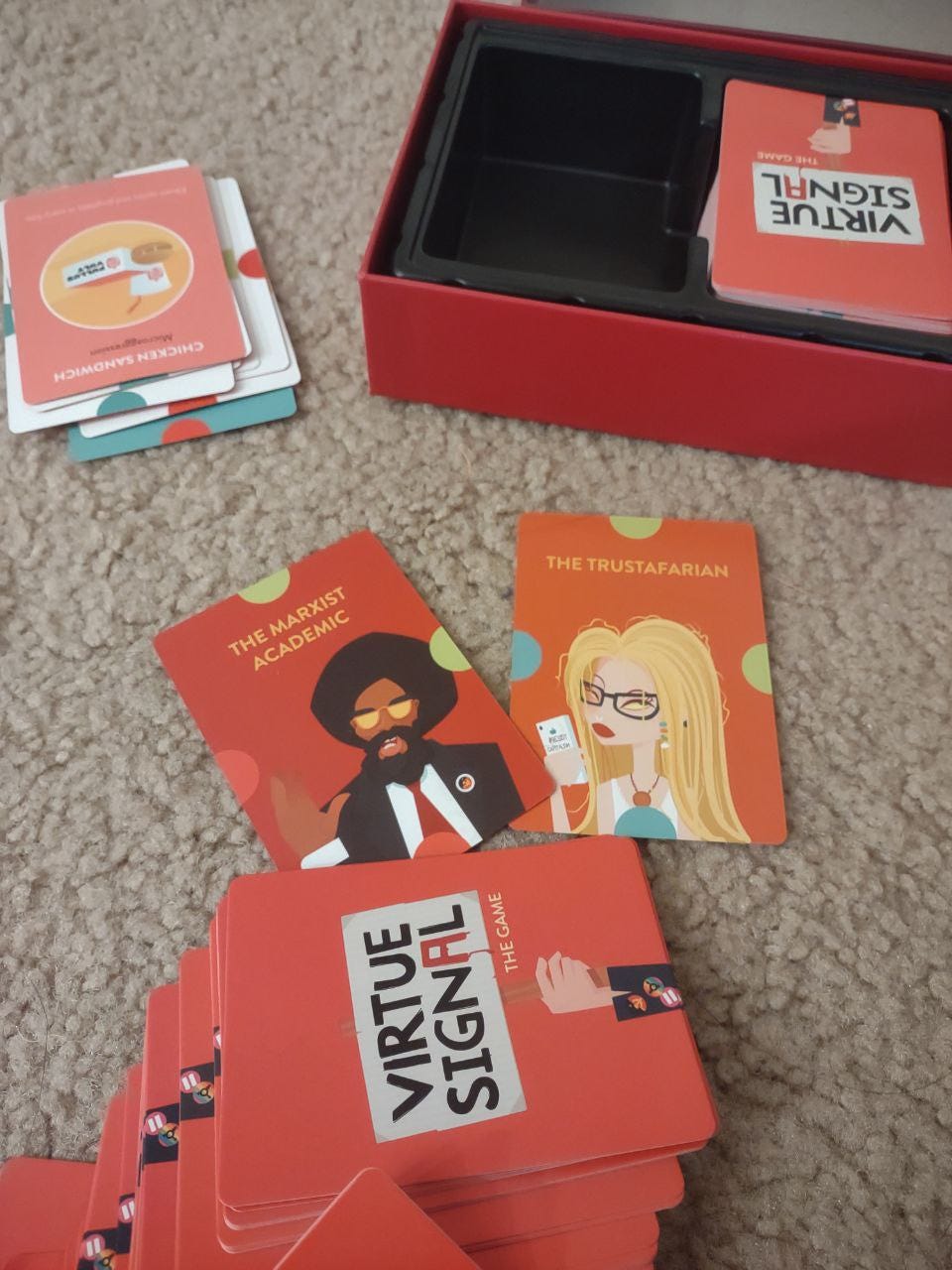Virtue Signal: The Card Game
A Review.
In game design, "Narratology" refers to a school of design which focuses on story, or narratives, as the main drive of game mechanics, playing, and theme itself. This is in contrast to "Ludology," which the main drive to game design is about mechanics, or the engineering aspect if a machine works. I subscribe to the latter, and doubt the existence of the former.
Sure, I got into board games because of theme. Games like Doom: The Board Game shocked me because I didn't even know that there was a "board game" version of a popular video! Narratology is a gateway for normal people to get interested into game design, but superficially, the design is focused on theme and if that theme matches the mechanics. I learned that games are not about theme, and true design is behind the skin color.
I stumbled across this card game that looks like and feels like Illuminati, but has a skin related to meme culture, the post-alt right, and anti-liberalism. Virtue Signal is a satirical game about that, by a publisher called "Incel Riot Games."
Yes, the novelty of the subculture is inherent in the setting. And like Cards Against Humanity or Really Karen?, normal consumers will buy the game because of the theme and less about the design. This perhaps is the only drawback of Virtue Signal. Otherwise, marketing aside, the game is a solid Take-That Kingsmaker brawl.
The objective of the game is to score 15 points at the end of your turn. Player's start out with a chosen, or random, decadent character that gives the player one ability. Definity more characters offered in Illuminati, and somewhat an expansive character selection realm like in Cosmic Encounter.
On your turn, you player a card as a single action, and then after, you draw up to seven cards in your hand, reminding me instantly of the fixed hand-size in Vampire: The Eternal Struggle. The play passes to the "left," if you catch that pun.
NPC cards attach to your player character on the side or on top, so as long as they match the color. Each NPC card can count as one, two, or three victory points. NPC cards can be nulled by Microagression cards, and this is the main strategy of the game that effects other players. The other player can counter with a "Safe Space" card, cancelling the Microagression, or on their turn, they can player the commonly-named "Virtue Signal" and cancel it that way. The game can work like a zero-influence Eurogame of building the biggest rig if unchecked. That is why Microagressions and Safe Spaces provide the crux of the Take-That card stacking window.
There are also special cards and plot cards. Special cards do something, and then discarded. Plot cards remain in play until they are discarded. With the right timing, Special and Plot cards can benefit other players and stop others.
Another special card I like is “Triggered,” which discards the entire hand, shuffles the cards back into the deck, and then on the draw phase, you draw back up to seven. Cards will be circulating throughout the game, as like in Killer Bunnies, only one randomized deck is shared among players. One the last NPC card is played to reach 15 points, and if anyone can counter it, that player wins the game.
Overall, this is a very basic racing game. Unlike Munchkin where players work together at times, there is only Kingsmaking from the mid to last stages of the game. If player's don't do anything, the game is just a solitaire race. Playing the Microagression is powerful against a two or three level NPC, but seems a little stiff with regards to level ones.
I wouldn't say this is a full clone of Illumnati or Cosmic Encounter. It's a very different game. I would love to see more player interaction and political voting than Take-That cycles of cancelling. Possibly add in a wager system or a currency? Not sure.
You can buy the game at Incel Riot Games now!
-pe
2/24/2023



